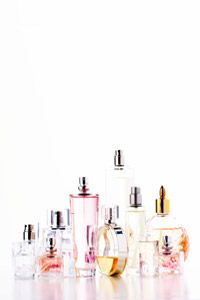 “If people can smell you before they can see you, you may need to lay off the perfume a bit.Martin Poole/Getty Images
“If people can smell you before they can see you, you may need to lay off the perfume a bit.Martin Poole/Getty Images
You all know her. She’s the woman who’s taken the phrase "signature scent" a little too far. You can smell her from 10 feet away. Her perfume fills the elevator, even if she’s gotten off five floors ago.
Wearing fragrance can be a wonderful way to express yourself, but too much can turn people off. While many people love to distinguish themselves with perfume, it can actually be harmful to others, causing migraines or allergic reactions that can impair breathing.
If nobody likes it when women wear too much perfume, then why do they do it? Sometimes the nose doesn’t know, particularly if a woman doesn’t have a very good sense of smell. Smoking can contribute to this, but smokers also use perfume as a way to cover up cigarette smell. Wearing too much perfume might also be an indicator of depression. Researchers from Tel Aviv University found that women who were depressed also lost their sense of smell. In order to compensate, they started wearing more perfume so that they’d be able to detect it on themselves.
Fragrance works by getting into the pores of your skin and reacting with your body’s chemistry to make the scent last. Perfume is also the strongest of all of the fragrance products. Compared to eau de parfum, eau de toilette, cologne and body splash, perfume has the highest concentration and strength of aromatic oils. Perfume is designed to be long lasting, so you don’t need to apply much to have a large effect.
When you’re used to wearing perfume every day, your senses can get also used to it and block it out, tempting you to apply too much. To tell if you’re a potential offender, put on your perfume as usual, wait five seconds, then put a tissue on that spot. The tissue shouldn’t stick. Time can help remedy the situation, but a quicker way to cut down on the odor is to put rubbing alcohol on a cotton ball and apply that on the areas where you put the fragrance.
Get into the habit of not wearing too much perfume in the first place and knowing where to apply it. Instead of putting it directly onto your skin, spray one blast upwards in the air in front of you and walk through the mist it creates. Choose a couple of places, such as your chest and neck and when applying, hold the bottle a good 10 inches (25.4 centimeters) away from your body when you spray. If you’re wearing a heavier scent, try applying it just to the lower part of your body, like a quick spritz behind the knees. The scent won’t rise as quickly and be as irritating to others. You’ll find the proper balance soon enough, and your scent will draw people closer rather than repel them.
Lots More Information
Related Articles
- Beware of Fragrance
- 5 Fragrances for 30-somethings
- 5 Fragrances for 20-somethings
- Guide to Selecting Natural Fragrance Oils
- How to Select a Signature Fragrance
- How to Avoid Secret Toxins in Your Perfume
- Can I be allergic to perfume?
- Can perfume trigger migraines?
Sources
- Bourne, Leah. "Should You Wear Perfume To Work?" Forbes. Feb. 7, 2012. (Aug. 24, 2012) http://www.forbes.com/sites/leahbourne/2012/02/07/should-you-wear-perfume-to-work/
- Intelligence For Your Life. "Are You Spraying Too Much Perfume?" Tesh.com. (Aug. 24, 2012) http://www.tesh.com/topics/random-intelligence-category/are-you-spraying-too-much-perfume/cc/17/id/11486
- International Fragrance Association. "Did you know?" (Aug. 24, 2012) http://www.ifraorg.org/en-us/did_you_know_2
- Keen, Judy. "Wearing perfume? You’re not allowed in here." USA Today. July 3, 2012. (Aug. 24, 2012) http://www.usatoday.com/news/nation/story/2012-07-02/fragance-ban-allergies/55988704/1
- Kozolchyk, Abbie. "6 Beauty Mistakes and How to Fix Them." Redbook. (Aug. 24, 2012) http://www.redbookmag.com/beauty-fashion/tips-advice/fixing-beauty-mistakes
- New Beauty. "Are You Wearing Way Too Much Perfume?" Nov. 12, 2009. (Aug. 24, 2012) http://www.newbeauty.com/blog/dailybeauty/1952-are-you-wearing-way-too-much-perfume/
- Tel Aviv University. "Wearing Too Much Perfume May Indicate Depression." ScienceDaily. Jan. 8, 2008. (Aug. 24, 2012) http://www.sciencedaily.com/releases/2008/01/080103124645.htm



























